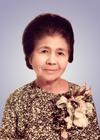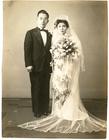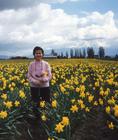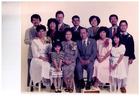Tule Lake
Brick #519 Wall Location Column: 83 Row: 18
Family was always Miyoko Koyama’s primary focus in her long life. As a legacy of her 65-year marriage to George Koyama, she filled dozens of albums with photos of the people she cherished and who cherished her in return.
Born Miyoko Hara on July 14, 1915, in Yakima, Washington, Miyoko moved to Saga-ken, Japan, with her family when she was 4. After graduating high school at the age of 17, she returned to Washington State with an older sister and helped their father farm in Yakima, where he was known as “the Potato King.”
As a young woman, she taught Japanese to young Japanese Americans who wanted to retain their parents’ language. Miyoko, herself, attended Edison Technical School (now known as Seattle Central Community College) to improve her English language skills.
Miyoko married George Koyama in 1938, and they began a family with son Richard in 1940. During World War II, the Koyama family was interned at Tule Lake relocation center, where second son Francis was born, and later at Minidoka. Although she spoke infrequently about their internment, Miyoko, known as a very private person, was particularly traumatized by the lack of privacy of the “camp” experience.
In 1946, daughter Linda was born, the same year George and two partners opened their auto repair and service business in Seattle’s International District. It was also the year Miyoko began writing haiku poems in Japanese, which became a lifelong pastime. She met regularly with Rainier Ginsha, a local haiku organization, and published poems in Japan. Observations of nature, her haiku were quiet reflections that evoked subtle feelings. Even at Seattle Keiro Nursing Home where she lived her final year and had little access to inspiring imagery, she managed to write about a butterfly that happened to flit past her window or the movement of leaves. She continued writing haiku until the last few weeks of her life. In 2011, a collection of 500 haiku was translated and published in Waiting for Spring (copies available from her family).
The year before their youngest child Tina was born in 1958, George and Miyoko bought a house in the Leschi neighborhood. With its sweeping view of Lake Washington, this home became Miyoko’s central passion. From the picture windows, she loved tracking the passage of traffic on the floating bridge, watching the moon rise over the lake and waiting for the sun to rise behind the Cascades. Her favorite activities – gardening, reading, completing jigsaw puzzles – were all things she enjoyed at home. After their children became adults, moved out and raised families of their own, nothing made her happier than having them gather annually in that home.
Miyoko was always interested and involved in her children’s activities, attended PTA meetings and school performances, and was den mother of her sons’ Cub Scout pack. A member of Seattle Betsuin Buddhist Temple and its Fujinkai organization, she volunteered many hours to temple activities.
Miyoko passed away on Jan. 15, 2009, at Seattle Keiro.
Donate A Brick
Honor any Japanese American who was interned or who has served in the military by donating a brick in thier name.
Brick Donation Form
Remaining Spaces:
Internee 456 | Veteran 113



